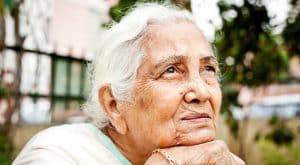Caregiving across the world is largely a woman’s job, show most studies. What are the implications and what should we do to change it?
In the summer of 2016, IT professional Nalini Kumar’s* mother had a fall and broke her femur bone. Kumar, who lived in Delhi then, packed her bags and moved in to care for her mother in Agra. It’s 2019 and Kumar hasn’t gone back to live in Delhi. The broken bone led to other ailments, and Kumar’s 84-year-old mother is unable to live on her own, even with round-the-clock paid help. Kumar’s older sibling lives in another metro and occasionally visits. He bears the costs for his mother’s medical expense but believes his sister is “better-suited” to take care of their parent.
“I had to move from a full-time job to contractual remote work when I realised she needed me around. I haven’t been able to give it my hundred per cent as I can’t leave my mother and step out much.” Kumar wishes there was an acknowledgement or understanding of the responsibility she bears daily. “I’m glad my brother shoulders the financial burden but few in our family realise how taxing everyday caregiving and taking care of small things like ayahs paying truant, organising medical equipment and unscheduled hospital runs can be.”
Kumar isn’t alone. The burden of caregiving mostly falls on women in the family, say studies.
WOMEN OFTEN SHOULDER CAREGIVING DUTIES
Caring At Home
A survey on ‘Role of Family in Caregiving’ by HelpAge India in June 2019 across 20 cities, showed that female caregivers outnumbered men when it came to providing physical care for activities of daily living (ADL) for elders. And in many cases, it is either the daughter or the daughter-in-law who does it. The survey showed that across the national level, 28 to 68 per cent of daughters-in-law are providing care for Instrumental Activities of Daily Living (IADL) such as preparing meals, helping with phone and housekeeping, taking medicine or managing money. The help for sons for such care ranged between 10 per cent to 51 per cent.
Female caregivers (56% to 59%) are also primarily the ones who extend emotional support to the elderly with problems like loneliness, anxiety and fear of dependence.
According to the HelpAge Survey, female Caregivers largely assist the elderly dependent except for assistance required in managing money where males assist the elderly dependent persons more. Most often, daughters-in-law followed by daughters support the elderly dependent in cooking or housekeeping. It is mainly the female caregivers, especially daughter or daughter-in-law who assist the elderly parent or parent-inlaw in visiting the hospital to seek treatment.
“Bulk of caregiving in our country falls within the family and community. There are very few cases of institutional care, even for people who can afford it. The government also believes that family is a mainstay and it reflects in our policies,” says Anupama Dutta, Head, Policy Research and Advocacy, HelpAge India.
Keeping that in mind, HelpAge India decided to analyse the changing realities of the family that the burden of caregiving is on.
Dutta feels it’s time to take note of some new realities. “Traditionally women were looking after the home. Now women are entering the workforce, especially among the middle class. If that is the case, we have to look at changing ethos within the family and the challenges the caregivers are facing.”
Mumbai based gerontologist Amruta Lovekar agrees. “Conventionally, in our families, caregiving burden is largely on women. It is accepted that women are good at this and supposed to fulfil their responsibility.” Lovekar feels it can have a significant impact on women, without the elderly themselves or the rest of the family realising it. Take the example of B*, a caregiver. One of her parents had orthopaedic surgery and another suffers from memory loss.
B continued to work for a year and finally had to give up her job as her parents were uncomfortable with a paid caregiver. Gradually it became impossible for B to step out, as her parents were unwilling to let anyone else share the burden with her.
Neelika Jain is a 40. Her ageing in-laws live with her, and her mother lives an hour’s drive away. Jain has a supportive spouse but admits that the bulk of emotional and instrumental support falls on her. “I also have two schoolgoing children, and a small enterprise I am actively involved in and managing everything does become tough.” She says her spouse chips in but the primary caregiving is part of her routine. “The assumption is that I’m good at managing elders, I have a flexible work schedule and that it (caregiving) comes naturally to me.” Is she uncomfortable about the expectation she bears? “I’ve never thought about this honestly,” she admits.
The numbers tilting towards women caregivers are not just for India alone. In the US, The National Alliance For Caregiving estimates that women provide 60-70 per cent of informal care for Alzheimer’s patients. Dutta feels that the care burden on women is also increasing because people are living longer. “Earlier life expectancy was much less, but now people live longer and therefore the duration of care is more.”
CAREGIVING WITHOUT SUPPORT CAN HAVE MENTAL AND PHYSICAL IMPACT
The Fallout
Caregiving regularly can be tiring, stressful, sometimes even thankless. The HelpAge study tries to point out that the caregivers are taking on this burden without much assistance. “It is important to look into the space of the Caregiver to understand the burden of eldercare and the challenges faced by them,” Mathew Cherian, Chief Executive Officer (CEO) HelpAge India was quoted saying in a report in Mint.
Could it lead to elder abuse? “The most common abuse we come across is disrespect, verbal abuse and neglect. This may sometimes be related to care because if the caregiver is caring for a long time, she does expect acknowledgement that mostly never comes. The caregiver may also be growing older herself, and it may be tough on her,” adds Dutta, though she cautions that abuse cannot be condoned, no matter what the circumstances are. But the root of the cause behind it could be caregiver stress and ignoring the gender angle to care.
“The government should encourage people to share the burden and create respite care so that the caregiver gets to take a break,” she adds. The caregivers in the HelpAge Survey are from the ‘sandwich generation’ who are looking after both the younger and the older generation.
Also Read: Why India’s Middle-Aged Are The New Sandwich Generation
Here too, it is mostly the women who shoulder the caregiving duties, and not everyone has the support of helping hands at home, whether for financial or socio-cultural reasons. Stress and lack of time for oneself are common. “During our survey, most women told us they were speaking to friends to share their worries and burden. This is indicative that there is a possibility of mental health nuances.” Dutta adds.
The caregiver’s mental health is not a big part of mental health discussions in our country when it should ideally be. Studies have shown that anxiety and depression can be common in caregivers of person’s with dementia. Physical health may also take a beating, leading to caregiver burnout.
The other implication is financial. Caregivers like Kumar have seen their income take a beating because of lack of time to find new work. Jain sometimes rues that her fledgeling enterprise has taken a backseat because often she has had no time to devote towards it, losing money in the process.
The New York Times’ article “The Weight of Elder Care on Women,” points out that fourteen million older Americans cannot live on their own and the burden of care falls predominantly on female relatives. Caregivers spend about 20 hours per week, providing care—half of a full-time job. Four out of five have missed work because of caregiving duties, and one out of ten have lost a job because of it.
In India, it’s hard to find such precise data. In the absence of more surveys on gender in caregiving and it’s implications, it’s also hard to figure out sometimes whether a change is afoot.
The Other View
Amrita Patil Pimpale of Echoing Healthy Ageing, Mumbai, which works with persons with Dementia and their caregivers, believes it’s hard to say if women always bear the primary burden of caregiving. She agrees though that caregiving may come naturally to many women.
“As professionals, we see clients ask for female caregivers and therapists. Caregiving services are dominantly female. It could be because by nature they have more empathy. However, we have also seen sons being involved, pay for things, take decisions. In some cases, the spouse of the person comes forward to take the decision. In other words, the leadership in the house matters in deciding who plays the caregiving role.”
At the same time, Patil-Pimpale feels there is no general rule.
“It also depends on the family structure and social strata sometimes. Our therapies are usually affordable for upper and upper-middle-class families where most women go out to work and have strong views. In most of these places, if women take on caregiving, it’s not because they are expected to do it but because they want to.”
Mumbai resident and former teacher Indrani Bose, 64, is one of those people who are caregivers by choice and not because they were expected to be. Bose took care of her late in-laws, followed by her parents. While her father passed away some months ago, her mother, who is 85, was diagnosed with Alzheimer’s in 2016. In Bose’s case, her family recognised the effort that went into her role as a primary caregiver and ensured she had the support she needed.
“When my mother-in-law fell ill, my father-in-law insisted I keep a paid caregiver so that I could continue with my job.”
Both Bose’s in-laws and parents emphasised on the need for a full-time paid attendant so that she did not have to put her life on hold and could work and travel. Her’s an example worth holding up because very often the caregiver’s own needs are overshadowed by the enormity of the ailment she is taking care of.
Patil-Pimpale thinks that gender roles around caregiving are gradually changing. Indeed in certain sections of society, it probably is. But research globally shows us that caregiving predominantly remains an area where the bulk of the responsibility falls on women and it’s time gender entered the caregiving conversation to make it an equal caring field.
Silver Talkies is an omnichannel social enterprise startup with a community of active and engaged older adults across Bangalore. We run www.silvertalkies.com, an online magazine for 55+; hold exclusive events and activities for senior citizens across Bangalore and also run clubs and active ageing spaces for elders. Silver Talkies also serves as a platform for senior citizens to get connected to products, services and jobs for older adults.





